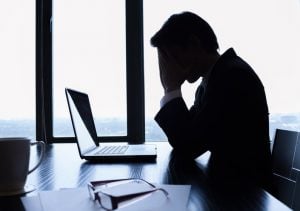This Biglaw Attorney Suffers From Depression And Wants Other Lawyers To Come Forward
'I felt scared. Ashamed. Crippled. As if I was going to die,' he writes. 'Perhaps most of all, I felt alone.'
 Lawyers are more likely to suffer from depression than any other profession, but they often suffer in silence for fear of alerting their colleagues about their mental health disabilities and being stigmatized for the rest of their careers. One Biglaw counsel recently stepped out from behind the dark veil that is depression to let the world know that not only is it possible to survive with the disorder, it’s possible to thrive.
Lawyers are more likely to suffer from depression than any other profession, but they often suffer in silence for fear of alerting their colleagues about their mental health disabilities and being stigmatized for the rest of their careers. One Biglaw counsel recently stepped out from behind the dark veil that is depression to let the world know that not only is it possible to survive with the disorder, it’s possible to thrive.
Meet Mark Goldstein, counsel at Reed Smith. Goldstein recently published a piece in the American Lawyer about his battle with depression. Goldstein was first diagnosed with severe depression, obsessive-compulsive disorder (OCD), and anxiety in September 2017. “I felt scared. Ashamed. Crippled. As if I was going to die,” he writes. “Perhaps most of all, I felt alone, particularly in a profession that often stigmatizes mental health disorders. A profession that tends to label them, instead, as ‘burnout,’ or sweep them under the rug.” It was Goldstein’s fear — fear of being labeled, fear of the stigma associated with mental health issues — that caused him to wait until he “simply could not function” at work anymore to tell the firm that he intended to take a leave of absence.
Much to Goldstein’s surprise, Reed Smith “was exceedingly supportive and conveyed a clear message: take all the time you need to recover.” After 11 weeks of recovery, reflection, and realization, Golstein returned to the firm, where he was “welcomed [] back with open arms.”

Early Adopters Of Legal AI Gaining Competitive Edge In Marketplace
Goldstein is now going public with his diagnosis because he has an important message to convey to all other attorneys with mental health issues of their own.
Speak up—and now. Forget about the perceived stigma surrounding mental health issues (and, yes, I know that’s easier said than done). There is literally nothing more important than your health and well-being. Be it a friend, family member, colleague, HR representative or someone else (feel free to make it me), you need to find at least one person in whom you can confide the gravity and extent of your struggles. You will not reach your professional goals—or, likely, your personal ones either for that matter—if you suffer in silence.
Contact a medical and/or mental health provider (some firms provide these services free-of-charge through employee assistance programs). Many mental health disabilities can be treated and contained through medication, therapy, a combination of both or some other means. A licensed professional will be able to work with you to determine the necessary approach based on your particular set of circumstances. …
Mark S. Goldstein (Photo via Reed Smith)
Don’t assume that others are not sensitive to or understanding of your situation. Perhaps the most enlightening revelation of the past year, for me, has been discovering that other attorneys with whom I work, whom I respect, and who seem so poised and polished, are also suffering mental health issues and have sought/are seeking treatment for the same. As mental health has become a more acceptable topic of public discussion, I am glad to have seen other attorneys come out of the woodwork to share their personal journeys. Which leads me to my final point, and this is critically important: Remember that you are NOT alone.
Goldstein has some advice for attorneys everywhere who may be struggling with depression: although you may think it seems impossible, you must prioritize your health and your well-being over your work. You must take care of yourself, because you are more important than your cases, no matter how important those cases are.
Goldstein wants to eliminate the stigma associated with mental health disorders, and believes that if enough attorneys suffering with these issues band together, a meaningful support network can be created and to help others in their own recovery.
Sponsored

Navigating Financial Success by Avoiding Common Pitfalls and Maximizing Firm Performance

Early Adopters Of Legal AI Gaining Competitive Edge In Marketplace

Legal AI: 3 Steps Law Firms Should Take Now

Navigating Financial Success by Avoiding Common Pitfalls and Maximizing Firm Performance
We’d like to extend our thanks to Mark Goldstein for his willingness to be one of the faces of this important issue in the legal profession. Because of him, we’re sure that many more lawyers will find the courage and confidence to step forward and share this part of themselves with their colleagues in the legal profession. Thank you.
‘Scared. Ashamed. Crippled.’: How One Lawyer Overcame Living With Depression in Big Law [American Lawyer]
 Staci Zaretsky is a senior editor at Above the Law, where she’s worked since 2011. She’d love to hear from you, so please feel free to email her with any tips, questions, comments, or critiques. You can follow her on Twitter or connect with her on LinkedIn.
Staci Zaretsky is a senior editor at Above the Law, where she’s worked since 2011. She’d love to hear from you, so please feel free to email her with any tips, questions, comments, or critiques. You can follow her on Twitter or connect with her on LinkedIn.
Sponsored

Is The Future Of Law Distributed? Lessons From The Tech Adoption Curve









